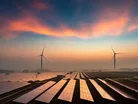Canadian mines hold the key to a clean energy future, report finds

The demand for clean energy is growing.
Globally, more and more governments, organisations and businesses are turning towards cleaner energy.
A new report from Clean Energy Canada finds that Canadian mines hold the key to powering this transition to clean energy, sparking new economic development in the process.
The report Mining for Clean Energy focuses specifically on the metal and mineral requirements for solar power and it reveals that Canada, home to 14 of the 19 metals and minerals needed for solar panels, may very become a key supplier for this changing tide over the next decade.
“People don’t naturally think of mining when they think of clean energy, but metals and minerals are key ingredients for solar panels, wind turbines and electric cars. Canadian miners have an opportunity to play a key role in the global transition to clean energy,” says Dan Woynillowicz, Policy Director, Clean Energy Canada.
“While it may be surprising to some, Canada’s mining sector could prove an important supplier of resources needed for the technologies that will help address climate change—while helping build Canada’s clean economy.”
Solar power on the rise
As the world bids to combat climate change, the turn towards solar power is something of a no brainer. Solar PV capacity is set to increase more than 17-fold between 2015 and 2050. It is already projected to rise to 547 GW by 2021 alone, double the capacity relative to 2015.
China, the U.S and India significantly contributed and will continue to contribute, to the rise of solar power. China added 30 GW in 2016, the U.S doubled the amount of solar electricity installations year on year and India doubled its entire solar capacity compared to the previous year.
The make-up of a solar PV Panel
Solar PV panels require 19 mineral products and metals:
- Copper (wiring; thin film solar cells)
- Indium (solar cells)
- Lead (batteries)
- Phosphate rock (phosphorous)
- Silica (solar cells)
- Selenium (solar cells)
- Iron ore (steel)
- Molybdenum (photovoltaic cells)
- Cadmium (thin film solar cells)
- Tellurium (solar cells)
- Titanium dioxide (solar panels)
- Gallium (solar cells)14
- Metallurgical coal
- Silver
- Germanium
- Tin
- Arsenic (gallium-arsenide
- semiconductor chips)
- Bauxite (aluminum)
- Boron minerals
- (semiconductor chips)
14 of these metals and minerals, are present in Canada, including copper, lead, silver, titanium and metallurgical coal.
Canadian copper on the global stage
The demand for copper is set to grow annually by nearly 2 percent, reaching a hugely significant 31 million tonnes by 2013. That’s a 43 percent increase over the current demand of 22 million as of 2017.
Canada has the world’s 10th largest copper reserves at 11 million tonnes, and in 2016 it was the world’s eigth largest producer with 720,000 tonnes.
Canada, quite clearly, has the potential to be a key driver of this clean energy transformation.
Clean energy, clean operations
Recycling needs to improve. It has been revealed that by 2030, the materials technically recoverable from recycled PV panels could produce around 60 million new panels.
The report points to the 180 million new panels that were produced in 2015.
